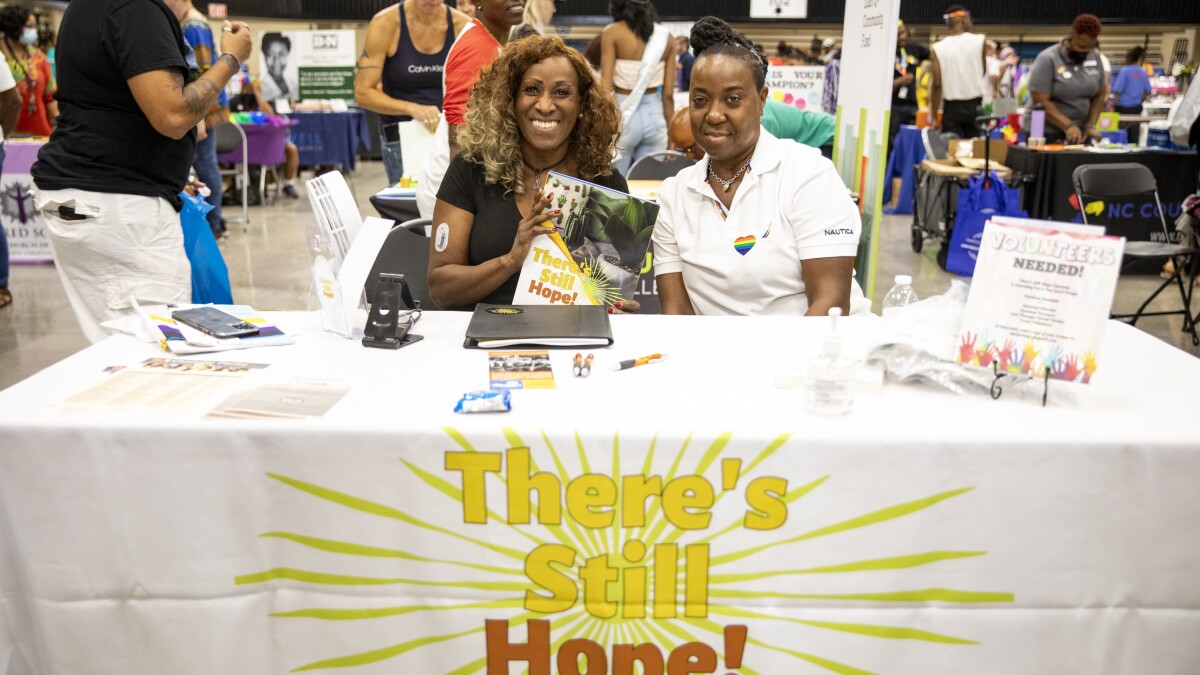
This story first appeared as part of WFAE’s EQUALibrium newsletter, exploring race and equity in the Charlotte region. Get the latest news and analysis in your inbox first by signing up here.
Rev. Debra Hopkins knew she wanted to help others in the community after she experienced homelessness during a bout of poor health. As a transgender woman, she had struggled to find refuge in the housing programs Charlotte offered — many of which are gender specific. So in 2017, she created her own: There’s Still Hope.
There’s Still Hope started as an emergency temporary shelter, in Hopkins’ one-bedroom apartment. It blossomed into the first transitional housing program in Charlotte specifically designed to serve transgender and nonbinary adults.
“I really wanted to just focus on a group of people who were being completely ignored, and those were the trans-identified adults who were struggling with homelessness here in Charlotte,” said Hopkins, a nondenominational minister.
“We knew that here in Charlotte, there was a program called Time Out Youth (to help homeless LGBTQ young people). Fabulous program, love the program,” she said. “But these kids age out of the program …There was no program available at the time for them to be able to bridge over.”
There’s Still Hope filled that gap. But after seven years, the organization is closing its doors this month.
“We’re closing this part of the transitional housing segment of the program because it’s hard to do the work when you’re doing, pretty much, the work by yourself,” Hopkins said.
That means potentially losing one of the only safe places trans and gender-diverse people struggling with homelessness can find housing, said Dr. Holly Savoy, executive director of Charlotte Trans Health.
“You take a community like transgender, and gender-diverse individuals, and know that they’re more marginalized in terms of being able to get employment, to get housing, to have identification that matches with their correct name, and gender, which can be a barrier,” she said. “There’s Still Hope was filling that need for a particular part of our community.”
The group served roughly 114 clients over the past seven years, and 77% were successful in completing the program by finding stable housing and full-time employment.
Hopkins found people housing by arranging contracts with extended-stay hotels. Program participants got their own fully furnished room with Wi-Fi, as well as weekly groceries and laundry assistance. Most funding for the program came from grants focused on LGBTQ people, as well as from individuals and local nonprofits like Equality NC and Human Rights Campaign of Charlotte.
To complete the program, participants had to stay for six months, as well as find and maintain full-time employment. After finding employment, participants needed to open a bank account. They were also required to attend weekly counseling sessions and basic money management classes, and they needed to save 85% of their income.
“It was all designed to launch them in the right way to get on their feet,” Hopkins said. “It’s just like any parent who’s raising their children. You’re taking care of them, but you’re teaching them how to save their money.”
Hopkins said for many transgender people, living on the streets might be preferable to facing discrimination from a landlord or family members.
“For a trans-identified person, you have to really be in their shoes to understand it,” Hopkins said. “A lot of people just can’t fathom they would be willing to live on the streets all because of their transition … I can relate because I experienced it myself, and I can understand their comments of saying I would rather live on the streets. I got that. I got that because I went through it. I said that I would rather live on the streets than to be treated discriminatively.”
Though Hopkins said she feels the program fills an essential need in the community, it was never her goal to run the program indefinitely.
“It was three years into the program that I realized that the goal for me was for someone, in particular within the trans-identified community, to come along where I could mentor them and walk them through how to run the program, and then turn it loose to them. But that never happened,” she said.
Running the program took a toll, and Hopkins plans to spend more time focusing on her health.
She still plans to advocate for the trans community through workshops and speaking engagements, but she’s sad to leave the housing program she started.
“The visions always started with one, but it takes a village to continue — for that program to sustain itself. It breaks my heart that I’m stepping away from this aspect of the program. But I’ll find a way to continue to be a voice in some form or another.”



